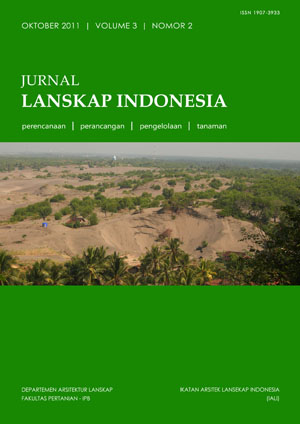PUBLIC PARTICIPATION ON OPEN SPACES’ INSPECTION
Abstract
Scientists agree that open space’s figures and width area in the cities are not only important to the beauty of the city, but also for improving the urban quality of living. It is related to the needs of places for sports and recreational purposes. Open spaces with particular greeneries will also able to fix the decreasing amount of carbon dioxide and other greenhouse gases effect.
One cause of the problem is the competition between the need of green open spaces versus the need of commercial land. Knowingly or not, in addition to commercial and other needs, societies in general and especially planners are less persistent in fighting for the presence of green open space. In particular, to show concerns with the proposed protest on its presence, even so aware of any changes in land use than originally
planned for the green to any other use.
Architecture and landscape architecture education ought to play the main role, encouraging its students to understand the importance of green open space provision and further, producing environmentally concerned and well-educated graduates.
This paper aims to review with a different perspective, the availability’s indicators of open space in the city, in terms of urban land use management, especially on increasing public awareness through participation in the monitoring changes in use and incompatibilities of the land use according to the plan. The study results shows that the participation of educated people as a watch-dog agents of the land use planning implementations could be the best and effective instruments to address socio-economic and urban architectural issues, instead of relying on local government building inspectors.
Downloads
This journal permits and encourages authors to post items submitted to the journal on personal websites or institutional repositories both prior to and after publication, while providing bibliographic details that credit, if applicable, its publication in this journal. However, after the article is submitted and published in this journal, it is fully copyrighted by the Jurnal Lanskap Indonesia or JLI. If excerpts from other copyrighted works are included, the author must obtain written permission from the copyright owner and give credit to the source in the article. Then, the writer or reader is allowed to copy, share, and redistribute articles/material in any form. But it must still include the appropriate source and credit because the article in this journal is licensed by Creative Commons Attribution 4.0 International License (CC BY 4.0).
I. Proposed Policy for Journals That Offer Open Access
Authors who publish with this journal agree to the following terms:
- Authors retain copyright and grant the journal right of first publication with the work simultaneously licensed under a Creative Commons Attribution License that allows others to share the work with an acknowledgement of the work's authorship and initial publication in this journal.
- Authors are able to enter into separate, additional contractual arrangements for the non-exclusive distribution of the journal's published version of the work (e.g., post it to an institutional repository or publish it in a book), with an acknowledgement of its initial publication in this journal.
- Authors are permitted and encouraged to post their work online (e.g., in institutional repositories or on their website) prior to and during the submission process, as it can lead to productive exchanges, as well as earlier and greater citation of published work (See The Effect of Open Access).
II. Proposed Policy for Journals That Offer Delayed Open Access
Authors who publish with this journal agree to the following terms:
- Authors retain copyright and grant the journal right of first publication, with the work after publication simultaneously licensed under a Creative Commons Attribution License that allows others to share the work with an acknowledgement of the work's authorship and initial publication in this journal.
- Authors are able to enter into separate, additional contractual arrangements for the non-exclusive distribution of the journal's published version of the work (e.g., post it to an institutional repository or publish it in a book), with an acknowledgement of its initial publication in this journal.
- Authors are permitted and encouraged to post their work online (e.g., in institutional repositories or on their website) prior to and during the submission process, as it can lead to productive exchanges, as well as earlier and greater citation of published work (See The Effect of Open Access).



























